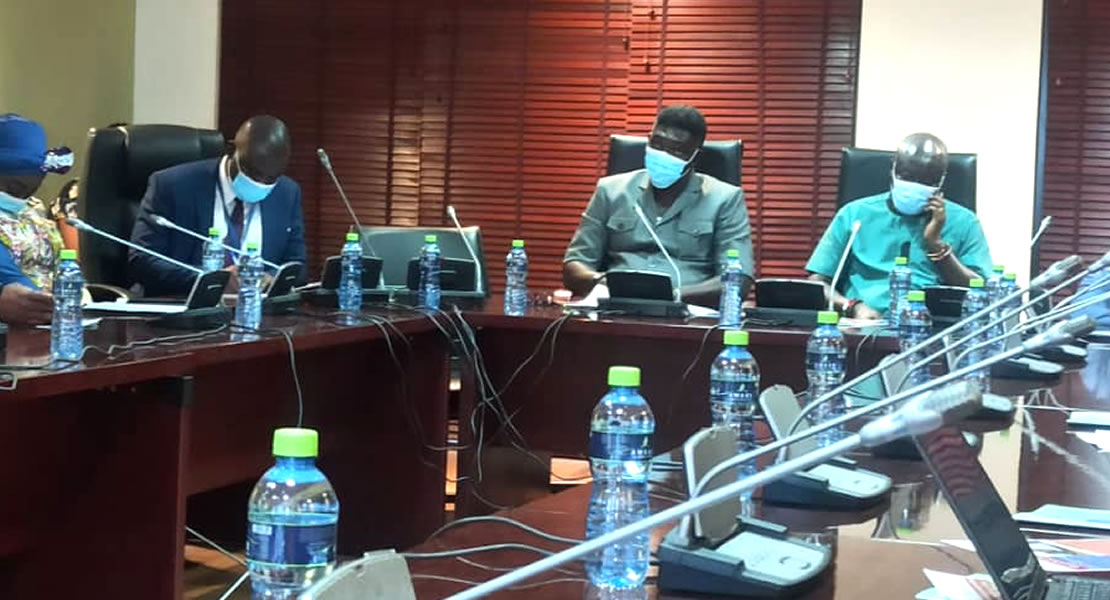
The Parliamentary Select Committee on Local Government, Decentralization and Rural Development has thrown its weight behind the Ghana Strengthening Accountability Mechanism (GSAM) project as it provides an independent, transparent and accountability on projects in the various communities.
The Chairman of the Committee, Emmanuel Akwasi Gyamfi gave the assurance of the committee’s readiness to join the advocacy for more support and the continuity of the project, when the Committee gave audience to CARE International, implementers of the Ghana Strengthening Accountability Mechanism (GSAM) project on Tuesday, February 15, 2022 in parliament.
“We are ready to work in collaboration with you to make sure that the 261 MMDAs get this training and capacity building for project implementation at the local level”, the chairman stated.
According to him, one of the major problems as a nation is issues surrounding implementation of projects at the local level, including physical infrastructure and other initiatives hence the recommendation by CARE for a policy or guidelines to be formulated by government to propel effective implementation, monitoring and evaluation of projects at the local level is a good call. “….that every project, either coming from the central government, it is coming from the local authority or where ever, there should be a laid down procedure, some guidelines for authorities to follow. For instance, we can’t have a contractor working on a project and the community is not aware of who that contractor is; I don’t think it is right. I don’t think it is right when for instance, a district assembly which is benefitting from a project is not aware of the cost of that project. So these are critical areas when all believe we need to work together to make sure that we get something done about it”, he emphasized.
Samuel Addai Boateng, Deputy Chief of Party – GSAM (Care International) said though the programme is expected to end in September this year, having run it since 2014 in selected 100 districts across the country, there is a need to institutionalize some of the positive observations to guide project implementation going forward.
He asserts that the use of community score cards by the citizenry to engage duty bearers at the district level has been very useful in terms of capital project implantation; adding that the combination of the top-down and bottom-up accountability approach which ensures that while the audit service is doing its auditing, the citizens are also monitoring from down, provides a lot of positive impact in the project implementation in the communities.
He, however, explained that they have identified some areas that require the push of the Committee, “to push them into policies, to push them into laws and other things that are within your mandate so that at the end of the day when they are documented they are something that can be institutionalized to become binding on project formulators and implementers.
Reason for the Engagement
CARE International and its partners met the Parliamentary Select Committee on Local Government, Decentralization and Rural Development to brief the committee on the Ghana Strengthening Accountability Mechanism (GSAM) project which is aimed at improving social accountability and local government transparency in Ghana.
It also presented some recommendations for considerations by the committee as follows:
- Adopt the concept of Community Development Monitors alongside sub-local structures in their community engagements and project monitoring activities
- Advocate for the Ministry of Finance to collaborate with Ghana Audit Service to strengthen the capacity of District Audit Committees to enable them to undertake regular annual performance audits fir the assemblies.
- Advocate for Assemblies to use Community score-cards in community engagement on projects and service delivery engagements, especially through the Social Audit Committees in the district.
About Ghana Strengthening Accountability Mechanisms (GEAM) Activity
The GSAM Activity is an eight-year (20142022) USAID supported Activity seeking to deepen and sustain responsive and accountable governance at the local level. it focuses on the delivery of quality services with increased accountability; specifically, supporting citizens to demand responsive governance and local authorities to improve management of policy implementation for efficient service delivery.
The Activity works with citizens to boost their participation in local government processes including planning and implementation of development projects through strengthening citizens’ oversight of capital development projects. This is aimed at improving local government transparency, accountability and performance across IQO districts in Ghana.
The Activity was initially implemented by a Consortium comprising CARE International in Ghana, OXFAM in Ghana and Integrated Social Development Centre (ISODEC), in collaboration with Ghana Audit Service and 25 other Civil Society Organizations (CSOs).
The Ghana Audit Service (GAS) under the Activity carried out performance audits of selected capital projects in 100 districts. The consortium translated the results of the audits into scorecards and disseminated in those districts. This provided citizens the opportunity to hold their District Assemblies accountable using the scorecards as the main accountability tool for engagements.
GSAM Achievements
GSAM has made significant progress towards improving and strengthening Ghana’s decentralization process, with an emphasis on citizen participation, civil society empowerment, management of capital project delivery and extensive awareness about good governance practices. Some highlights include:
- Deepened citizen participation: Over 200, 000 citizens in 100 districts have had the opportunity to engage with their district authorities on issues of capital project planning and implementation and to demand an improved performance from the District Assemblies.
- Improved quality of capital project delivery: Citizens and civil societies supported to monitor and evaluate the delivery of 387 capital projects in 50 districts between 2015 and 2020.
- Strengthened CSOs capacities: Through training and technical assistance, 25 local civil society groups have gained new capacities that empower them to collaborate with citizens to influence local decision-making processes and support development in local communities.
- Increased citizen awareness: Raised awareness about social accountability reaching more than 2.5 million citizens nationwide through news articles, radio and television programs, social media, websites and documentaries.
Dominic Shirimori/Ghanadistricts.com